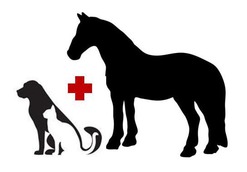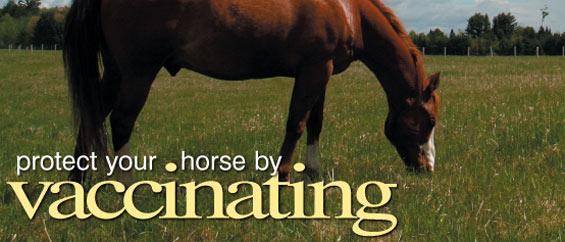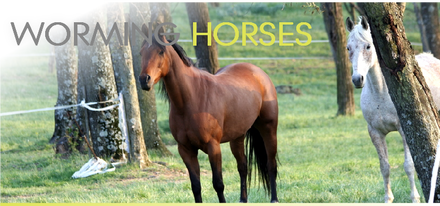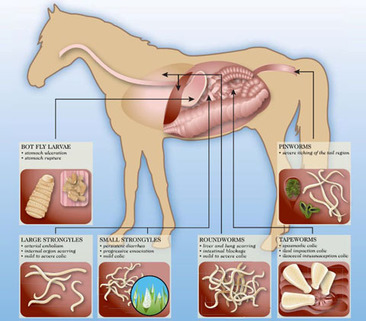by Amy Ortez, DVM
|
|
SPRING SHOTS & WORMINGSpringtime means vaccine and de-wormer time. The American Association for Equine Practitioners has a great reference for horse owners regarding vaccine recommendations. They have information regarding the recommended core vaccines as well as risk-based vaccines. Vaccines should be boostered either once or twice a year depending on risk and sometimes, depending on how hard the veterinarian tries to make it an agreeable experience, horses can have sore necks, swelling, fever and maybe be lethargic for a few days. These unpleasant side effects can have owners asking, “do we really need all of these vaccines?” Let's investigate this question....
|
EQUINE VACCINATION
Starting with rabies, the mother of all vaccines, the answer is, “YES.” Rabies is 100% fatal. That means that if someone, humans included, contracts rabies, they will die. It doesn't matter if they receive the best medical care in the world. They will die. A sore neck is a minimal side effect when compared to being dead. Rabies is also zoonotic, meaning humans could contract the disease from infected horses or other animals.
Moving on to the wonderful multivalent EWT vaccine. This protects from eastern equine encephalitis (EEE), western equine encephalitis (WEE) and tetanus. Horses contract eastern or western equine encephalitis from mosquitoes. EEE is diagnosed every year in the US. Most horses diagnosed have not been vaccinated appropriately. Treatment is expensive and the disease has a 90% mortality rate. Tetanus comes from the bacteria Clostridium tetani. This bacteria is ubiquitous in the environment but most commonly associated with punctures from rusty nails or farm equipment. The vaccine is very effective.
Humans, horses and birds are the most susceptible species to West Nile Virus. The virus, like the other encephalitis, is carried via mosquitoes. The vaccine is most effective when given alone and not in a multivalent vaccine like EWT. The vaccine offers great protection and should be given to all horses. Having witnessed an unvaccinated horse die of WNV despite aggressive around the clock efforts, the author will always strongly recommends giving the vaccine.
The other vaccines are given based on a horse's risk to exposure. These are best to discuss with your veterinarian to decide if your horse needs protection.
Vaccines cause some discomfort but the risks outweigh the benefits. They save lives and have greatly improved horses health and well being. Discuss which vaccines your horse should be administered with your veterinarian. Not vaccinating puts you and your horse at an unnecessary risk.
Starting with rabies, the mother of all vaccines, the answer is, “YES.” Rabies is 100% fatal. That means that if someone, humans included, contracts rabies, they will die. It doesn't matter if they receive the best medical care in the world. They will die. A sore neck is a minimal side effect when compared to being dead. Rabies is also zoonotic, meaning humans could contract the disease from infected horses or other animals.
Moving on to the wonderful multivalent EWT vaccine. This protects from eastern equine encephalitis (EEE), western equine encephalitis (WEE) and tetanus. Horses contract eastern or western equine encephalitis from mosquitoes. EEE is diagnosed every year in the US. Most horses diagnosed have not been vaccinated appropriately. Treatment is expensive and the disease has a 90% mortality rate. Tetanus comes from the bacteria Clostridium tetani. This bacteria is ubiquitous in the environment but most commonly associated with punctures from rusty nails or farm equipment. The vaccine is very effective.
Humans, horses and birds are the most susceptible species to West Nile Virus. The virus, like the other encephalitis, is carried via mosquitoes. The vaccine is most effective when given alone and not in a multivalent vaccine like EWT. The vaccine offers great protection and should be given to all horses. Having witnessed an unvaccinated horse die of WNV despite aggressive around the clock efforts, the author will always strongly recommends giving the vaccine.
The other vaccines are given based on a horse's risk to exposure. These are best to discuss with your veterinarian to decide if your horse needs protection.
Vaccines cause some discomfort but the risks outweigh the benefits. They save lives and have greatly improved horses health and well being. Discuss which vaccines your horse should be administered with your veterinarian. Not vaccinating puts you and your horse at an unnecessary risk.

EQUINE WORMING
Deworming is another area where confusion about what to use and when to use it may lie. Prior to dewormers, horses would die from Strongyle and Tapeworm infestations. The worms would cause impactions and intassuceptions. Pinworms would cause them to have itchy hind ends where they would scratch and rub, causing wounds to their hind quarters and ruin their tails. The dreaded bot eggs that stick to their legs in the summer would end up being bot larvae that set up residence in their stomach.
Twenty years ago veterinarians would come out and give the dewormer by placing a nasogastric tube up the horses nose and into their stomach. Both veterinarians and horses are relieved there are now easier ways to administer the medications. Recommendations used to call for monthly or every other month deworming. There are still companies that recommend such practices and products that even encourage daily deworming. Over the years it has become very apparent that trying to kill every worm that lives in the intestines is not practical and has lead to these parasite developing effective resistance to many dewormers. The idea that the dewormers may no longer be effective is terrifying and great care must be taken to ensure that their potency be maintained for as long as possible.
So what are the new guidelines for deworming? It's important to start with a fecal egg count. This is a test where, after some processing, the fecal material is examined under the microscope for parasitic eggs. The type of eggs and the number present will dictate the deworming protocol. The test should be performed initially on every horse on the property. It is well known that 80% of the worm burden may be carried in 20% of the herd. This means that two horses could be eating the same grass nose to nose, and one may have a heavy burden and the other may have no detectable eggs. It would not make sense to deworm these two horses with the same frequency. The exception to this rule is when dealing with tapeworms. Tapeworms are shed intermittently in the feces so a random fecal exam may miss their presence. Because of this intermittent shedding and the danger of tapeworms, using a product that kills tapeworms is recommended at least once a year. Ivermectin and pyrantel pomoate do not kill tapeworms. Praziquantrel or a double dose of fenbendazole for 5 days are the only current products to treat tapeworms.
The drugs available to treat worm infestations are very powerful. They must remain potent despite being exposed to the powerful acids and digestive enzymes in the stomach and make it to the intestines where the worms live. The difference between a drug and a toxin is dose. Please pay attention to the manufacturer's recommendations for treating with the appropriate amount of medication. This is extremely important when using Selemectin (Quest and Quest Plus). Overdosing a horse on these medications can lead to severe neurologic issues. More drug does not always mean more effective worm killing.
Vaccines and dewormers have greatly improved the quality and length of horse's lives. Rabies is a rare occurrence in developed worlds and that is due to the vigilant vaccine requirements of these nations. A professor of mine in vet school was from Mexico. He visited with two children who were bitten by a rabid dog. The one child died quickly. The other boy asked the veterinarian if he was going to die too. He did.
Deworming is another area where confusion about what to use and when to use it may lie. Prior to dewormers, horses would die from Strongyle and Tapeworm infestations. The worms would cause impactions and intassuceptions. Pinworms would cause them to have itchy hind ends where they would scratch and rub, causing wounds to their hind quarters and ruin their tails. The dreaded bot eggs that stick to their legs in the summer would end up being bot larvae that set up residence in their stomach.
Twenty years ago veterinarians would come out and give the dewormer by placing a nasogastric tube up the horses nose and into their stomach. Both veterinarians and horses are relieved there are now easier ways to administer the medications. Recommendations used to call for monthly or every other month deworming. There are still companies that recommend such practices and products that even encourage daily deworming. Over the years it has become very apparent that trying to kill every worm that lives in the intestines is not practical and has lead to these parasite developing effective resistance to many dewormers. The idea that the dewormers may no longer be effective is terrifying and great care must be taken to ensure that their potency be maintained for as long as possible.
So what are the new guidelines for deworming? It's important to start with a fecal egg count. This is a test where, after some processing, the fecal material is examined under the microscope for parasitic eggs. The type of eggs and the number present will dictate the deworming protocol. The test should be performed initially on every horse on the property. It is well known that 80% of the worm burden may be carried in 20% of the herd. This means that two horses could be eating the same grass nose to nose, and one may have a heavy burden and the other may have no detectable eggs. It would not make sense to deworm these two horses with the same frequency. The exception to this rule is when dealing with tapeworms. Tapeworms are shed intermittently in the feces so a random fecal exam may miss their presence. Because of this intermittent shedding and the danger of tapeworms, using a product that kills tapeworms is recommended at least once a year. Ivermectin and pyrantel pomoate do not kill tapeworms. Praziquantrel or a double dose of fenbendazole for 5 days are the only current products to treat tapeworms.
The drugs available to treat worm infestations are very powerful. They must remain potent despite being exposed to the powerful acids and digestive enzymes in the stomach and make it to the intestines where the worms live. The difference between a drug and a toxin is dose. Please pay attention to the manufacturer's recommendations for treating with the appropriate amount of medication. This is extremely important when using Selemectin (Quest and Quest Plus). Overdosing a horse on these medications can lead to severe neurologic issues. More drug does not always mean more effective worm killing.
Vaccines and dewormers have greatly improved the quality and length of horse's lives. Rabies is a rare occurrence in developed worlds and that is due to the vigilant vaccine requirements of these nations. A professor of mine in vet school was from Mexico. He visited with two children who were bitten by a rabid dog. The one child died quickly. The other boy asked the veterinarian if he was going to die too. He did.
|
DISCLAIMER
The information contained on this website is not meant to diagnose, treat, cure, or prevent any disease. Information found on this website is meant for educational and informational purposes only. When in doubt, consult your veterinarian. |









